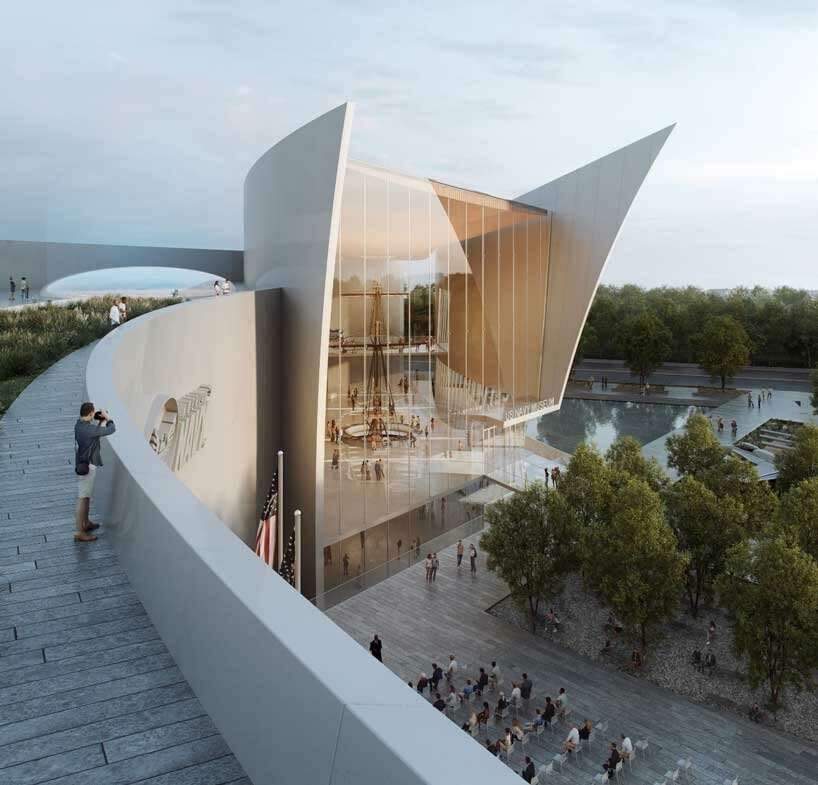Happy Wednesday and Happy Thanksgiving! All of us here at AN are grateful for our readers, event attendees, and sponsors. Pending any breaking news, we’ll take it easy over this holiday weekend and will fully “restart the presses” (!) on Monday, November 28, when we will be back online with more architecture news. In the meantime, here are a few stories you may have missed this past week. Read on for great archi-fodder that’s sure to spur conversation around the dining table.
Airbnb cofounder unveils Samara’s Backyard, a line of customizable, prefabricated ADUs
As the housing market continues to boil over and ADUs offer some temporary relief, there’s a new offering for prefabricated backyard dwellings: Meet Backyard, the first offering by Samara, a start-up launched by Airbnb cofounder Joe Gebbia with Mike McNamara. Trained as a designer at RISD, Gebbia is also the financial oomph behind the Eames Institute of Infinite Curiosity, which recently acquired William Stout Architectural Books in San Francisco.
Billed as “the little house designed for the next chapter of your life,” Backyard offers factory-built dwellings shaped as rectangular boxes with a pitched roof. They come in two sizes: studio (430 square feet, starting at $289,000) and one-bedroom (550 square feet, starting at $329,000). Each unit is customizable, so buyers can configure their base color, roof color, entrance location (side or front), deck, windows, solar capabilities, wardrobe finish, blinds, and more.
Backyard’s units are “precision-built using highly durable, environmentally-considerate materials that aren’t readily available to most builders,” according to a press release, and arrive with appliances and storage. Each unit is structured with a light-gauge steel frame, wrapped in insulated 2” thick, steel-clad panels, and topped in a 5:12 Galvalume-coated standing seam metal roof. Its HVAC system also purifies air, “which helps cut down on air contaminants like wildfire smoke.” The product is fully electric and includes solar panels on its metal roof. Samara offers an impressive list of end-to-end services, including surveying, permitting, unit fabrication, foundation, and installation.
Samara’s Backyard offering will help speed densification and aid owners in transforming “their yard into a useful, productive asset that can help them improve their quality of life and achieve more financial independence.” The current wait time for a Backyard unit is about seven months, and the company estimates its product saves four to six months when compared to traditional site-built construction. For now, Backyard is only available in northern and southern California.
Boston City Hall Plaza reopens to the public after extensive renovation
This past week, for the first time, residents of Boston were able to enjoy the newly reopened City Hall Plaza, a reimagined interstitial urban space activated with benches, playgrounds, and public art. The renovation project, part of a 30-year master plan for the municipal site first proposed by former Mayor Marty Walsh in 2015, was headed by architecture firm Sasaki. It focused on accessibility and sustainability for Bean Town’s “front yard.”
In addition to playgrounds and a robust landscaping scheme, improvements around the site include a new stormwater management system, 100 new trees, updated lighting, and recycled brick and granite pavers.
“We are proud of the bold vision the City embraced to make Boston City Hall Plaza an inviting and accessible outdoor public space,” said Fiske Crowell, Sasaki principal and architect in a statement. “A robust community engagement process helped us transform the Plaza from a harsh outdoor environment into a new green space where all are welcome.”
The revamped plaza nestled between Congress Street and Cambridge Street, is adjacent to the hulking, Brutalist City Hall building, designed by British-American architect Noel Michael McKinnell, which opened in 1969.
“City Hall Plaza is a space to bring people together and build community,” said Mayor Michelle Wu. “I’m grateful for the work of all our City workers and partners to transform the plaza into a welcoming, resilient, and accessible space for residents and visitors to enjoy.”
Faculty at The New School continue strike for higher wages
The strike by part-time faculty at The New School has entered its seventh day following the expiration of an eight-year-old contract. The New School, which houses the Parsons School of Design, has long faced criticism over its underpayment of adjunct faculty, and its egregious payment of high-level administrators. (87 percent of The New School’s faculty are adjunct professors.)
Represented by the United Auto Workers (UAW)—who also represent the 48,000 workers currently striking at the University of California system, and adjunct faculty members who were on strike at New York University last month—faculty organized through A.C.T.-U.A.W. Local 7902 has said that the 3.5 percent wage increase presented by the university is insufficient, exacerbated by the recent inflation.
Union members are requesting a 10 percent wage increase, with five percent annual raises, as opposed to the two percent currently being offered by the university during negotiations. Members are also bargaining for expanded access to healthcare for part-time faculty, input into curricula, increased protection against discrimination, and better job security. During the current emergency agreement between the union and the university, members have not received raises or retirement contributions.
H/t to The New York Times

Construction kicks off at Atlanta’s Centennial Yards development
Centennial Yards broke ground last week in Atlanta. The $5 billion, 50-acre development stands to reshape the city’s southwestern area of downtown, a region that’s now a series of surface parking lots adjacent to Mercedes Benz Stadium and State Farm Arena. Foster + Partners and the Atlanta studio of Perkins&Will established its overall site plan. When fully built out, the project is expected to include 5 million square feet of new residential buildings and 4 million square feet of new commercial buildings, including new office, retail, restaurants, and hotels.
In a neighborhood known as The Gulch, a “literal hole in the heart of the city,” according to press materials, the project will link historic neighborhoods long isolated due to industrial infrastructures. Centennial Yards is also committed to the belief that it will be built by and lived in by Atlantans. It stands to deliver 20 percent affordable housing for 99 years. The construction strives to meet a 38 percent goal for the participation of minority and female owned business participation including design, development, and property management; and 25 percent of entry-level construction jobs at Centennial Yards—and 10 percent of all construction jobs—are targeted for workers from around downtown Atlanta.
The first phase includes two new high-rises both designed by Atlanta-based architecture firms Goode Van Slyke Architects (GVSA) and TVS Architecture + Design: One is an 18-story boutique hotel, and the other is an 18-story residential tower. These two towers are expected to be completed in 2025. (One Centennial Yards, a tower designed by SOM with GVSA, was previously announced earlier this year.) Beyond buildings, which are financed in part by a $2 billion tax incentive package, the development, adjacent to two MARTA train stops, intends to “bring increased connectivity, walkability, and 24/7 living to the heart of Atlanta.”
The clock is ticking, as Atlanta is one of the cities in the United States that will host World Cup games in 2026 when FIFA stages its competition in sixteen venues across the continent. Although the full scope may take a decade to complete, in past coverage Brian McGowan, president of Centennial Yards Company, said his team aims to “have much of the planned mini-city erected in today’s Gulch in time for World Cup fanatics to celebrate before, during, and after games.”
In coordination with this groundbreaking, Atlanta’s mayor Andre Dickens noted that “With the development of Centennial Yards, we have an opportunity to further revitalize Downtown while bridging the gap between the east and westsides of our city.” He added that “this project is uniquely Atlanta—bringing the public, private and non-profit sectors together to dream big and execute a plan in a thoughtful and deliberate manner.”
Cornell University reappoints architect J. Meejin Yoon as dean of its College of Architecture
Architect and educator J. Meejin Yoon has been reappointed as the Gale and Ira Drukier Dean of Cornell University’s College of Architecture, Art and Planning (AAP). Effective through January 2, 2024, Yoon’s tenure extension follows nearly three years of leadership as dean throughout the pandemic, during which she oversaw an expansion of the school’s academic programs.
Yoon, an undergraduate alumnus of Cornell, is known for her work as cofounder of Boston-based architecture firm Höweler + Yoon. Since 2004, the firm’s work has included the Memorial to Enslaved Laborers at the University of Virginia, the Moongate Bridge in Shanghai, and the recently opened MIT Museum. The office was the subject of AN’s latest studio visit.
To date, in her tenure as dean she helped establish a number of programs, including the Paul Rubacha Department of Real Estate (in collaboration with the Cornell SC Johnson College of Business), the Cornell Mui Ho Center for Cities, an Office of Diversity Equity and Inclusion, and the endowment of the Gensler Family AAP NYC Center. Recognizing her contributions to culture at large, Yoon was elected to the American Academy of Arts and Letters in 2021 and the recipient of the 2022 Leonardo da Vinci World award.



